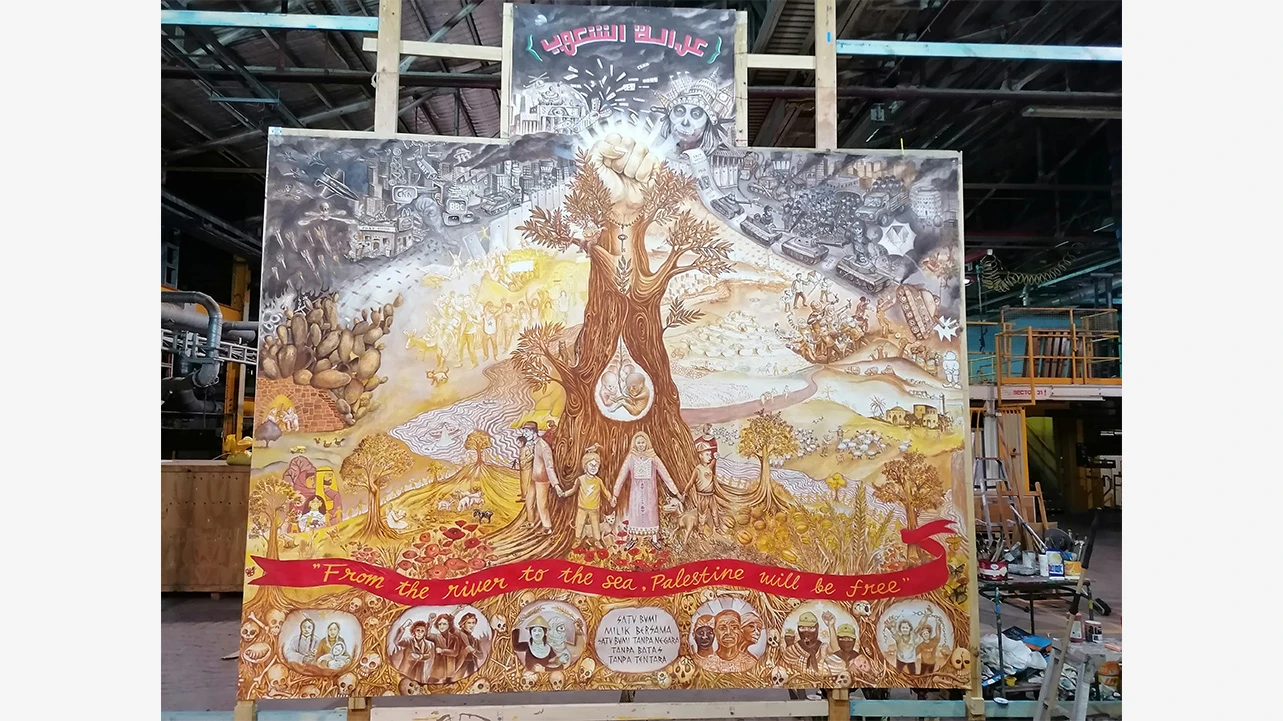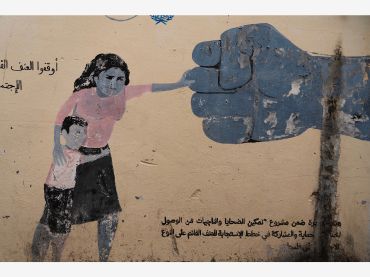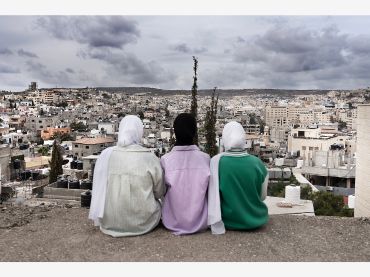Critical Thinking Gatherings
International Solidarity with Palestine

Held on 08, 13, 16 May, 05, 08, 24 Jun, 11 Dec 2024; 08 Jan 2025
The emergency situation afflicting Gaza since October 2023 has induced the Museo Reina Sofía, in collaboration with TEJA. The Network of Cultural Spaces in Support of Emergency Situations, to organise a special programme in solidarity with Palestine and as a call for the end of the war and genocide in the Mashriq region.
Through art, this programme looks to create collective spaces of critical thought on today’s complex geopolitical stage, in addition to supporting Palestinian artists and curators with a view to connecting their struggles and experiences with networks of international solidarity.
The programme assembles a variety of formats and initiatives which offer different perspectives and are developed at different points through lectures, conversations, encounters with Palestinian artists, podcasts, a publication by the museum confederation L’Internationale, and the sixth edition of the Neighbourhood Picnic, all of which unites to demand the end of the war in Gaza, and all wars that threaten lives. Furthermore, the programme resonates in two works which have recently been incorporated into the Museo Reina Sofía Collection and which explore the past and present of the war in Palestine: Amos Gitai’s Chronique d’un assasinat (artist donation, 2022) and At Those Terrifying Frontiers Where the Existence and Disappearance of People Fade Into Each Other, by Basel Abbas and Ruanne Abou-Rahme (donation by Mercedes Vilardell, 2024).
Activities
-
Wednesday, 8 May 2024 Nouvel Building, Auditorium 200, and online platform
Palestine Is the Measure of Our Capacity to Change the World
Lecture by Françoise Vergès
Online platformFeminist and anti-racist political scientist Françoise Vergès gives a lecture on the relationship between the massacre of the Palestinian people and the history of Western democracies built on colonialism, and thus on the genocide of indigenous peoples, extraction, exploitation and destruction of the environment. Vergès analyses how, along with other peoples from the Congo, Sudan, Kashmir and those territories struggling for freedom and decolonialisation, Palestine represents an example of resistance to the global reactionism shaped by the extreme militarisation, dehumanisation and absolutist and authoritarian thinking that perpetuates colonial domination.

-
Thursday, 16 May 2024 Nouvel Building, Auditorium 200, and online platform
Situated Voices 31
Voices for Palestine against the World’s Militarisation
Online platformThe assembly of Museo Situado, made up of social collectives from the Lavapiés neighbourhood in Madrid, in which the Museo Reina Sofía also participates, devotes this thirty-first edition of Situated Voices to thinking collectively, from this context, about the forms of opposition to the war in Gaza — and all wars — as well as strategies of support and solidarity with the Palestinian people. The current context of militarisation and global fear, intensified in recent years by the Russian invasion of Ukraine, raises the question of how we can organise against world destruction. In this session, Museo Situado assembles different voices to hear their analyses and political practices and thereby contribute to collectively building a future of justice, reparation and peace in Palestine and around the world.

-
Wednesday, 5 June 2024 Nouvel Building, Auditorium 200, online platform and Sabatini Building, Protocol Room
Palestine Is Everywhere
Encounter and Screening
Tickets— Conducted by Amin Husain, Nitasha Dhillon (Decolonize This Place), Marina Garcés and Massimiliano Mollona (Institute of Radical Imagination)
This session features the presentation of the global project Palestine is Everywhere, centred on the actions of activists who, from different places in the world, aim to spotlight the oppression of the Palestinian people and their struggle for freedom. The presentation, conducted by Amin Husain and Nitasha Dhillon from the Decolonize This Place (DTP) movement, philosopher Marina Garcés, and Massimiliano Mollona, from the Institute of Radical Imagination (IRI), is made up of a round-table discussion and the screening of different video extracts with interventions from renowned theorists and artists, before closing with a streamed poetic reading by Palestinian writer and lecturer Ibrahim Nasrallah.

-
Saturday, 8 June 2024 Sabatini Building, Garden
Neighbourhood Picnic
Now in its sixth edition, the Neighbourhood Picnic returns to turn the Museo Reina Sofía Garden into a space of encounter, enjoyment and resistance by and for all residents from Madrid’s Lavapiés neighbourhood. This year, given the emergency situation in Palestine, the Museo Situado assembly sets forth a performance action that condemns the war in Gaza and a discussion with feminist philosopher Silvia Federici.
-
Monday, 24 June 2024 Nouvel Building, Auditorium 200, and online platform
Narratives from Palestine
Screening and Discussion with the Artists Shuruq Harb and Lara Salous
Online platformThis encounter welcomes screenings of films by Shuruq Harb (Ramallah, 1980), Shereen Abdel-Karim Hassanein (Gaza City, 1996) and Lara Salous (Ramallah, 1988), three Palestinian multidisciplinary artists that are part of the Tadafuq project, which provides artistic training and mentoring online for Palestinian creatives from the Gaza Strip, the West Bank and Jerusalem. The initiative has been developed by artist and curator Nicolás Combarro since 2020.
Alongside the film screenings is a conversation between Harb and Salous, accompanied by Sara Buraya Boned (Museo Reina Sofía), as they reflect on their experience as Palestinian women artists from a feminist perspective, exploring the possibilities of disseminating the Palestinian cause through their art-making, work which is punctuated by their ideas, desires and personal hopes.

Collection
-
Until 30 Septembre, 2024 Sabatini Building, Floor 0, Protocol Room
At Those Terrifying Frontiers Where the Existence and Disappearance of People Fade Into Each Other
Basel Abbas and Ruanne Abou-Rahme
The audiovisual piece by Basel Abbas and Ruanne Abou-Rahme, entitled At Those Terrifying Frontiers Where the Existence and Disappearance of People Fade Into Each Other, spotlights the violence implicit in the construction of images and the position facing people considered illegal, disposable and invisible, not only in Palestine but also in broader political and social contexts, at those terrifying frontiers where the existence and disappearance of people fade into each other. The work, eleven minutes in length, combines three visual elements which overlap to form layers of information: night-time images of the wall that runs along the Gaza Strip, digital images of avatars and a reflective text by the artists. The work was donated to the Museo Reina Sofía Collection by Mercedes Vilardell in 2024.
-
Until 1 July, 2024
Chroniques d’un assasinat
Amos Gitai
The installation Chroniques d’un assasinat (Chronicles of an Assassination, 2021), donated to the Museo in 2022 by its creator, the artist Amos Gitai, focuses on the assassination of Israel’s Prime Minister Yitzhak Rabin in 1995, which shocked the world and brought the peace plans to end the Israeli-Palestinian conflict to a standstill. This major event also impacted the artist, who turned it into one of the main threads in his work. Chroniques d’un assasinat sets forth a spatial journey around pertinent scenes from Rabin, the Last Day (2015) by way of fourteen panels and seven sound documents. Using collage, akin to a film montage, Gitai combines archive documents, press images and stills which intervene to dissect the context of a tragic moment that changed the history of the Middle East.
Publications
-
Online publication
Towards Collective Study in Times of Emergency
L’Internationale Online Editorial Board
Since the start of the war in Gaza in October 2023, the museum confederation L’Internationale, of which the Museo Reina Sofía is part, has supported and organised a series of actions that include residencies for Palestinian artists and specific, conflict-related programmes. Among these initiatives is the digital publication Towards Collective Study in Times of Emergency, published by the L’Internationale Online Editorial Board, which contains interventions by Learning Palestine Group, Radio Alhara, Lara Khaldi and Yazan Khalili, Rana Issa, Françoise Vergès, Bojana Piškur, Mick Wilson, Ovidiu Tichindeleanu, The Free Palestine Iniciative Croatia and Baqiya and Yu’ad. The publication is part of the Critical Media Alliances activity within the Museum of the Commons programme.
Radio RRS
-
Podcast
Meira Asher
TANSIK تنسيق
Listen to podcastTansik (تنسيق) means “coordination” in Arabic. Picking olives in zones of the West Bank under Israeli military control requires “coordination” with the Israeli army, yet the real purpose of such “coordination” is to make harvesting problematic and cause damage. During October and November in 2019, Meira Asher, a composer, performer and human rights activist, joined her friends Kalef and Walid to harvest olives in the town of Kufr Qaddum. This podcast, commissioned by the Museo Reina Sofía, witnesses Asher document the situation via interviews and her own experience.
-
Podcast
Heba Y. Amin
The General's Stork
Listen to podcastIn 2013, the Egyptian authorities withheld a stork migrating from Hungary to Israel due to an electronic device that was attached to its back. The suspicion was espionage. The podcast The General’s Stork (2018), by Egyptian artist and lecturer Heba Y. Amin, explores the historical accounts of biblical prophecies, colonial narrations, and the politics of war technology from a bird’s-eye view. When the war started to be dictated by technological needs, conquering the sky turned Western armed conflicts into a high-tech armed spectacle. Since then, technological aesthetics have been intrinsically linked to the image of the Middle East, and the language of occupation and colonisation translated into the vision of the landscape at war as a topographic study, a kind of aerial cartography of bombing and drones.
Museo Tentacular Networks
-
Network
TEJA. The Network of Cultural Spaces in Support of Emergency Situations
Made up of seventeen culture organisations from Spain, among them the Museo Reina Sofía, TEJA came into being after the Russian invasion of Ukraine and going forward it offers artist residencies, accommodation, support and legal counsel to artists and culture professionals affected by armed conflicts, political repression and other emergency situations. Today, the Museo supports Palestinian artists Motasem Siam, Lara Salous and Shuruq Harb by way of public presentations and activations, advocating their contact with artistic communities and networks from the institution and the city of Madrid.
Más actividades
![Tracey Rose, The Black Sun Black Star and Moon [La luna estrella negro y negro sol], 2014.](https://recursos.museoreinasofia.es/styles/small_landscape/public/Obra/AD07091_2.jpg.webp)
On Black Study: Towards a Black Poethics of Contamination
Monday 27, Tuesday 28 and Wednesday 29 of April, 2026 – 16:00 h
The seminar On Black Study: Towards a Black Poethics of Contamination proposes Black Study as a critical and methodological practice that has emerged in and against racial capitalism, colonial modernity and institutional capture. Framed through what the invited researcher and practitioner Ishy Pryce-Parchment terms a Black poethics of contamination, the seminar considers what it might mean to think Blackness (and therefore Black Study) as contagious, diffuse and spreadable matter. To do so, it enacts a constellation of diasporic methodologies and black aesthetic practices that harbor “contamination” -ideas that travel through texts, geographies, bodies and histories- as a method and as a condition.
If Blackness enters Western modernity from the position of the Middle Passage and its afterlives, it also names a condition from which alternative modes of being, knowing and relating are continually forged. From within this errant boundarylessness, Black creative-intellectual practice unfolds as what might be called a history of touches: transmissions, residues and socialities that unsettle the fantasy of pure or self-contained knowledge.
Situated within Black radical aesthetics, Black feminist theory and diasporic poetics, the seminar traces a genealogy of Black Study not as an object of analysis but as methodological propositions that continue to shape contemporary aesthetic and political life. Against mastery as the horizon of study, the group shifts attention from what we know to how we know. It foregrounds creative Black methodological practices—fahima ife’s anindex (via Fred Moten), Katherine McKittrick’s expansive use of the footnote, citation as relational and loving labour, the aesthetics of Black miscellanea, and Christina Sharpe’s practices of annotation—as procedures that disorganise dominant regimes of knowledge. In this sense, Black Study is approached not as a discrete academic field but as a feel for knowing and knowledge: a constellation of insurgent practices—reading, gathering, listening, annotating, refusing, world-making—that operate both within and beyond the university.
The study sessions propose to experiment with form in order to embrace how ‘black people have always used interdisciplinary methodologies to explain, explore, and story the world.’ Through engagements with thinkers and practitioners such as Katherine McKittrick, C.L.R. James, Sylvia Wynter, Christina Sharpe, Fred Moten, Tina Campt, Hilton Als, John Akomfrah, fahima ife and Dionne Brand, we ask: What might it mean to study together, incompletely and without recourse to individuation? How might aesthetic practice function as a poethical intervention in the ongoing work of what Sylvia Wynter calls the practice of doing humanness?

Intergenerationality
Thursday, 9 April 2026 – 5:30pm
This series is organised by equipoMotor, a group of teenagers, young people and older people who have participated in the Museo Reina Sofía’s previous community education projects, and is structured around four themed blocks that pivot on the monstrous.
The third session gazes at film as a place from which to dismantle the idea of one sole history and one sole time. From a decolonial and queer perspective, it explores films which break the straight line of past-present-future, which mix memories, slow progress and leave space for rhythms which customarily make no room for official accounts. Here the images open cracks through which bodies, voices and affects appear, disrupting archive and questioning who narrates, and from where and for whom. The proposal is at once simple and ambitious: use film to imagine other modes of remembering, belonging and projecting futures we have not yet been able to live.

Remedios Zafra
Thursday March 19, 2026 - 19:00 h
The José Luis Brea Chair, dedicated to reflecting on the image and the epistemology of visuality in contemporary culture, opens its program with an inaugural lecture by essayist and thinker Remedios Zafra.
“That the contemporary antifeminist upsurge is constructed as an anti-intellectual drive is no coincidence; the two feed into one another. To advance a reactionary discourse that defends inequality, it is necessary to challenge gender studies and gender-equality policies, but also to devalue the very foundations of knowledge in which these have been most intensely developed over recent decades—while also undermining their institutional support: universities, art and research centers, and academic culture.
Feminism has been deeply linked to the affirmation of the most committed humanist thought. Periods of enlightenment and moments of transition toward more just social forms—sustained by education—have been when feminist demands have emerged most strongly. Awareness and achievements in equality increase when education plays a leading social role; thus, devaluing intellectual work also contributes to harming feminism, and vice versa, insofar as the bond between knowledge and feminism is not only conceptual and historical, but also intimate and political.
Today, antifeminism is used globally as the symbolic adhesive of far-right movements, in parallel with the devaluation of forms of knowledge emerging from the university and from science—mistreated by hoaxes and disinformation on social networks and through the spectacularization of life mediated by screens. These are consequences bound up with the primacy of a scopic value that for some time has been denigrating thought and positioning what is most seen as what is most valuable within the normalized mediation of technology. This inertia coexists with techno-libertarian proclamations that reactivate a patriarchy that uses the resentment of many men as a seductive and cohesive force to preserve and inflame privileges in the new world as techno-scenario.
This lecture will address this epochal context, delving into the synchronicity of these upsurges through an additional parallel between forms of patriarchal domination and techno-labor domination. A parallel in which feminism and intellectual work are both being harmed, while also sending signals that in both lie emancipatory responses to today’s reactionary turns and the neutralization of critique. This consonance would also speak to how the perverse patriarchal basis that turns women into sustainers of their own subordination finds its equivalent in the encouraged self-exploitation of cultural workers; in the legitimation of affective capital and symbolic capital as sufficient forms of payment; in the blurring of boundaries between life and work and in domestic isolation; or in the pressure to please and comply as an extended patriarchal form—today linked to the feigned enthusiasm of precarious workers, but also to technological adulation. In response to possible resistance and intellectual action, patriarchy has associated feminists with a future foretold as unhappy for them, equating “thought and consciousness” with unhappiness—where these have in fact been (and continue to be) levers of autonomy and emancipation.”
— Remedios Zafra

ARCO2045. The Future, for Now
Saturday 7, March 2026 - 9:30pm
The future, its unstable and subjective nature, and its possible scenarios are the conceptual focus of ARCOmadrid 2026. A vision of the future linked to recent memory, a flash of insight into a double-edged sword. This year's edition, as in the previous two, will once again hold its closing party at the Reina Sofia Museum. This time, the star of the show is Carles Congost (Olot, Girona, 1970), one of the artists featured in the new presentation of the Collections recently inaugurated on the 4th floor of the Sabatini Building.
Carles Congost, with his ironic and timeless gaze, is responsible for setting the tone for this imperfect future, with a DJ session accompanied by some of his works in the Cloister on the first floor of the Sabatini Building of the Museo on the night of Saturday 7 March.

27th Contemporary Art Conservation Conference
Wednesday, 4, and Thursday, 5 March 2026
The 27th Contemporary Art Conservation Conference, organised by the Museo Reina Sofía’s Department of Conservation and Restoration, with the sponsorship of the Mapfre Foundation, is held on 4 and 5 March 2026. This international encounter sets out to share and debate experience and research, open new channels of study and reflect on conservation and the professional practice of restorers.
This edition will be held with in-person and online attendance formats, occurring simultaneously, via twenty-minute interventions followed by a five-minute Q&A.
![Shuruq Harb. The Jump [El salto], Palestina, 2021. Cortesía de la artista](https://recursos.museoreinasofia.es/styles/small_landscape/public/Actividades/narrativas_desde_palestina._una_poetica_del_territorio_0.jpg.webp)